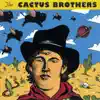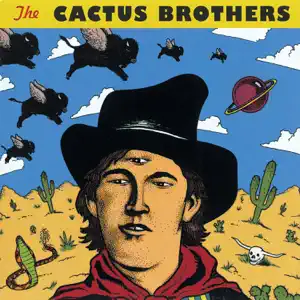


Acerca de The Cactus Brothers
Originally a side project for several members of Nashville's popular Walk the West, the Cactus Brothers eventually overshadowed their alter ego to take on a life of their own. After touring for the better part of a year in support of Walk the West's self-titled 1986 debut album, vocalist/guitarist Paul Kirby and bass player John Golemon joined with multi-instrumentalist Tramp to play at a friend's funeral. With Walk the West cohort Will Golemon (banjo/guitar) in tow, the four soon started gigging around Nashville and the Southeast, playing acoustic sets that offered more of a traditional country sound than the country-rock that Kirby et al. displayed on the album. It wasn't long before the popularity of the Cactus Brothers surpassed that of Walk the West, which was having trouble with the expectations of its West Coast label. Dropped from the Capital EMI roster, Walk the West subsequently transformed itself into the Cactus Brothers.
The trio of Paul Kirby and the Golemon brothers had been playing music together since grade school, Kirby the son of songwriter Dave Kirby (writer of "Is Anybody Goin' to San Antone") and the Golemons the sons of songwriter Guy Golemon. Tramp, equally adept at fiddle, mandolin, and guitar, earned his stripes as a member of the Kendalls' touring band. Manager John Lomax III brought in dulcimer master David Schnaufer and, adding drummer David Kennedy and steel guitar player Sam Poland, the Cactus Brothers hit the road. The band was signed to Jimmy Bowen's Liberty Records in 1992, the Nashville office of the same label that had dropped Walk the West, recording its self-titled debut album in 1993 with producers Allen Reynolds and Mark Miller. The band toured for almost two full years to support the album, performing in 38 states, Canada, Mexico, and six European countries.
The Cactus Brothers were one of the earliest country bands to embrace video and cable television as a way to reach an audience. Videos for "Fisher's Hornpipe" and "Crazy Heart," from the band's debut album, would go on to win Bronze Awards in the Worldfest Competition in Houston in 1994. A video for the band's scorching cover of the country classic "Sixteen Tons" earned significant airtime on cable networks VH1 and CMT. The band performed in the film Pure Country, appearing alongside country star George Strait, and starred in a comic book illustrated by noted Austin, TX, artist Mack White. The Cactus Brothers returned to the studio in 1995 with producer Randy Scruggs to record 24 Hrs., 7 Days a Week with the help of John Mellencamp drummer Kenny Aronoff and Double Trouble keyboard wizard Reese Wynans. By this time, Poland, Schnaufer, and Kennedy had left the band, replaced by steel guitarist Jim Fungaroli and drummer Johnny Tulucci, who played in the theatrical presentation of Always Patsy Cline.
The bandmembers would make history later that year when they would become the first Nashville artists to travel to the former Soviet satellite state of Estonia, performing at the Baltic country's third annual Country Picnic, a show that was filmed for later broadcast on Estonian television. By this time, a familiar cycle was recurring, and changes in executives at the label left the band on the outside. By the end of 1995, the Cactus Brothers were out of a job at Capitol EMI and, one by one, the members drifted off to other gigs. The talented Tramp resurfaced in Bonepony, while former member David Schnaufer joined Nashville's prestigious Blair School of Music as a professor; he performs at mountain music and bluegrass festivals and markets his music online. ~ Rev. Keith A. Gordon
The trio of Paul Kirby and the Golemon brothers had been playing music together since grade school, Kirby the son of songwriter Dave Kirby (writer of "Is Anybody Goin' to San Antone") and the Golemons the sons of songwriter Guy Golemon. Tramp, equally adept at fiddle, mandolin, and guitar, earned his stripes as a member of the Kendalls' touring band. Manager John Lomax III brought in dulcimer master David Schnaufer and, adding drummer David Kennedy and steel guitar player Sam Poland, the Cactus Brothers hit the road. The band was signed to Jimmy Bowen's Liberty Records in 1992, the Nashville office of the same label that had dropped Walk the West, recording its self-titled debut album in 1993 with producers Allen Reynolds and Mark Miller. The band toured for almost two full years to support the album, performing in 38 states, Canada, Mexico, and six European countries.
The Cactus Brothers were one of the earliest country bands to embrace video and cable television as a way to reach an audience. Videos for "Fisher's Hornpipe" and "Crazy Heart," from the band's debut album, would go on to win Bronze Awards in the Worldfest Competition in Houston in 1994. A video for the band's scorching cover of the country classic "Sixteen Tons" earned significant airtime on cable networks VH1 and CMT. The band performed in the film Pure Country, appearing alongside country star George Strait, and starred in a comic book illustrated by noted Austin, TX, artist Mack White. The Cactus Brothers returned to the studio in 1995 with producer Randy Scruggs to record 24 Hrs., 7 Days a Week with the help of John Mellencamp drummer Kenny Aronoff and Double Trouble keyboard wizard Reese Wynans. By this time, Poland, Schnaufer, and Kennedy had left the band, replaced by steel guitarist Jim Fungaroli and drummer Johnny Tulucci, who played in the theatrical presentation of Always Patsy Cline.
The bandmembers would make history later that year when they would become the first Nashville artists to travel to the former Soviet satellite state of Estonia, performing at the Baltic country's third annual Country Picnic, a show that was filmed for later broadcast on Estonian television. By this time, a familiar cycle was recurring, and changes in executives at the label left the band on the outside. By the end of 1995, the Cactus Brothers were out of a job at Capitol EMI and, one by one, the members drifted off to other gigs. The talented Tramp resurfaced in Bonepony, while former member David Schnaufer joined Nashville's prestigious Blair School of Music as a professor; he performs at mountain music and bluegrass festivals and markets his music online. ~ Rev. Keith A. Gordon
Nosotros
Notas
